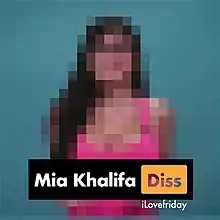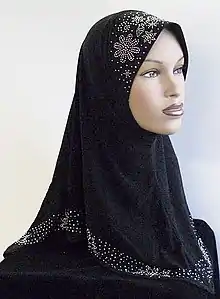Mia Khalifa (song)
"Mia Khalifa" (originally titled "Mia Khalifa (Diss)", also known as "Hit or Miss", and sometimes stylized as MiA KHALiFA) is a song by American hip hop group iLoveFriday (stylized as iLOVEFRiDAY). The duo of Atlanta-based rappers Aqsa Malik (also known as Smoke Hijabi) and Xeno Carr self-released the song on February 12, 2018, which was later re-released by Records Co and Columbia Records on December 14, 2018. It was included on their second EP, Mood (2019). The song was produced by Carr. The song is a diss track targeting Mia Khalifa, a Lebanese-American Internet celebrity and former pornographic actress.
| "Mia Khalifa" | ||||
|---|---|---|---|---|
 | ||||
| Single by iLoveFriday | ||||
| from the EP Mood | ||||
| Released | February 12, 2018 | |||
| Recorded | 2018 | |||
| Genre | Hip hop | |||
| Length | 2:57 | |||
| Label | ||||
| Songwriter(s) |
| |||
| Producer(s) | Xeno Carr | |||
| iLoveFriday singles chronology | ||||
| ||||
| Music video | ||||
| "Mia Khalifa" on YouTube | ||||
The decision to write a song dissing Khalifa arose over a misunderstanding. A faked screenshot, intended as a joke, seemed to show Khalifa criticizing Malik for smoking while wearing a hijab in a music video. iLoveFriday and their fans assumed the screenshot was real and took offense at Khalifa's apparent hypocrisy. Khalifa has not publicly commented on the song, however, a comment on a TikTok post on June 28th, 2020 from Khalifa's official account miakhalifa stated that "This... is my nightmares. God, this was global, I couldn't escape it." Critics have praised the song for its unconventional catchiness, but it has also been criticized as off-key and misogynistic.
Months after its release, "Mia Khalifa" achieved unexpected viral success on social media, especially among TikTok users. The best-known portion is Malik's verse, which opens with a line that became a meme: "Hit or miss, I guess they never miss, huh?"
Background and release

The music video for iLoveFriday's 2017 song "Hate Me" showed Malik, a Pakistani-American woman, smoking a blunt while wearing a hijab, a type of veil worn by some Muslim women and traditionally used to maintain Islamic standards of modesty.[2]
The song and video were modest successes and gained traction within some online meme-centric communities. By January 2018, an Instagram account posted a screenshot of a fake tweet, attributed to Mia Khalifa, that criticized Malik and the "Hate Me" video. The fake tweet said:
"She's so disrespectful to all Muslim women and gives us a bad image 🤦♀️🧕🏾💣."[3]
Not only was the tweet fake, but Khalifa is actually not Muslim and never has been. She was raised in the Catholic Church in Lebanon but is non-practicing.[4]
Although the screenshot was a joke, Malik said that she believed it was real when she first saw it and was shocked by the statement's apparent hypocrisy, given Khalifa's notoriety for appearing in a pornographic video performing sex acts while wearing a hijab. Malik said in an interview that smoking in a hijab is "not nearly as bad" as what Khalifa had done in a hijab.[5] Many of iLoveFriday's fans also took the screenshot to be authentic and reacted with anger toward Khalifa. There has been some skepticism about whether the group members themselves realized the screenshot was a joke.[3][6]
Regardless, iLoveFriday recorded "Mia Khalifa" in response to their fans' demand for a diss track. The song was self-released on February 12, 2018.[7][3] The music video for "Mia Khalifa" was released on March 4, 2018.[8] The video was reportedly viewed about 5 million times in the months before it became a viral meme.[3] The song was later re-released by Records Co and Columbia Records on December 14, 2018. In early 2019, the original video was briefly removed due to a copyright infringement claim from Romanian artist Livia Fălcaru, as multiple pieces of her original art appear in the video without her permission.[3] On September 27, 2019, "Mia Khalifa" was released as the first track on Mood, iLoveFriday's second EP.[9]
Music and reception
The song was produced by Xeno Carr.[2] Malik's verse has been described as the highlight of the song with its distinctive, catchy delivery. According to college newspaper Minnesota Daily, "the song itself rose to notoriety not because of its associations with Mia Khalifa, but rather due to a bizarrely catchy rap bridge."[12] The opening lines have been the most frequently quoted and reused in memes:
"Hit or miss, I guess they never miss, huh? / You got a boyfriend, I bet he doesn't kiss ya / He gon find another girl and he won't miss ya / He gon skrrt and hit the dab like Wiz Khalifa."[6]
The song itself is sometimes known as "Hit or Miss" because of the lines.[13] At Pitchfork, Duncan Cooper said the verse captured Malik "at her absolute brattiest". Cooper emphasized her delivery of the phrase "kiss yaaaa!", noting the quality of an "almost Midwestern whine" in her voice despite her Atlanta origins, and wrote that "her melodies are straight and piercing, catchy to an obnoxious degree."[3]
The song also uses sound effects from the arcade game Street Fighter II, including the Capcom logo jingle and the "Fight!" announcer clip.[14]
A panel of reviewers at Vice roundly condemned the song, calling it "upsettingly misogynistic in a really specific and sick way" and "really off-key and shitty sounding." According to Vice's panel, iLoveFriday should issue "a formal apology" to Khalifa.[10] An article in the college newspaper KentWired expressed similar feelings, further accusing the song of "pettiness" and criticizing the bland production and Malik's "grating voice".[11]
Bhad Bhabie—an American rapper and Internet celebrity, perhaps best known for saying "Catch me outside, how about that?" on Dr. Phil—criticized the song as inappropriate for children who were likely to be exposed to it through social media. When asked whether she thought the Internet has a negative effect on children's psychological maturity, Bhad Bhabie replied:
"Yes. It's not even their fault. Sometimes I'm around kids scrolling through TikTok or whatever and that iLoveFriday 'Mia Khalifa' song will pop up and I'll be like, 'Stop listening to that! No!' This girl listening is like seven, she doesn't understand what this song means."[15]
Even in the aftermath of its viral success, Khalifa has never publicly commented on the song. According to Reed Kavner at the site Tubefilter, "it's worth reiterating that [Khalifa] was an innocent bystander in all of this. She was the subject of a diss track after doing absolutely nothing. Today, she has 2.3 million Twitter followers and a YouTube channel with her boyfriend celebrity chef Robert Sandberg. None of this will affect her at all."[6]
Viral success
"Mia Khalifa" and TikTok memes
TikTok is a social media video app owned by the Chinese tech company ByteDance. Formed from a merger with the app Musical.ly in 2018, TikTok allows users to post short videos and use audio clips from its database, generally to make lip sync videos. Some of the audio in the database is officially licensed by the copyright holders, but users can also upload an audio clip on their own, at which point the clip becomes available to other users.[3] TikTok is particularly popular among Generation Z, defined as those born after 1996.[16] The app has been compared to the defunct Vine.[3][16]
"Mia Khalifa" became ubiquitous on TikTok in late 2018 and early 2019.[16] The song became so popular, and was so closely identified with the app itself, that it spawned a call and response meme called the "#hitormiss challenge" or "#TikTokTest". To participate in the challenge, TikTok users would wander into public areas like big-box stores or schools and holler the phrase "hit or miss", hoping to elicit a response from a stranger who might complete the line by calling out "I guess they never miss, huh?" The premise of the meme was that the phrase had become so well known among TikTok users that it could serve as a sort of "secret handshake" to find other users in the real world.[6][17] As with the app itself, the song and its related memes were mostly produced and consumed by teenage members of Generation Z.[18]
The song demonstrated how social media, meme culture, and TikTok in particular function as important platforms for listeners to discover new music.[3][19] In this capacity, it has been identified as a predecessor to Lil Nas X's "Old Town Road", another song by a previously unknown and unsigned artist that found viral success through TikTok.[20][21][22][13] While other songs reached comparable levels of popularity on the app around the same time—including, for example, Ariana Grande's "Thank U, Next"—"Mia Khalifa" was different because its success was completely spontaneous. Grande was already a mainstream artist with major promotion and an established following, while iLoveFriday had minimal promotion and their song's unconventional style did not seem, on its face, calibrated to have broad appeal.[3]
The 15-second "hit or miss" snippet from "Mia Khalifa" was first uploaded to TikTok by a high-school age girl from South Dakota.[3] Then, a TikTok user named Georgia Twinn made a highly popular video using the same clip, drawing greater attention to the song.[3][23] In October 2018, the user @NyanNyanCosplay lip-synced the song while cosplaying as the character Nico Yazawa from the Japanese multimedia franchise Love Live!.[2] @NyanNyanCosplay's video was likely the catalyst that inspired the viral phenomenon around the song.[22] @NyanNyanCosplay's video spread to YouTube, where PewDiePie—already the world's most popular individual YouTuber—reused her clip several times in his own videos.[3] Belle Delphine, who has been noted for popularizing the e-girl aesthetic online, also uploaded a notable video of her lip-syncing and dancing along to the song. The Daily Dot wrote that "Delphine's brilliant pink hair and coy personality quickly made the video a hit."[24]
Popularity based on metrics
Near the end of October 2018, there were more than 1.3 million different videos on TikTok using the same sample;[2] by December, there were more than 2.5 million.[6] By February 2019, at least 4 million different "Mia Khalifa" videos had been uploaded to TikTok, the original music video had been viewed more than 50 million times, and snippets from the song had been played in videos across YouTube approximately 200 million times.[3] The song also reached the number one position on Spotify's Global Viral 50 chart, a ranking of the most-streamed independent songs on the platform, and it consistently charted near the top position for several months.[16][19]
As of June 2020, TikTok videos which include "Mia Khalifa" have been viewed over 865 million times in total.[25] Videos tagged with the #hitormisschallenge hashtag had collectively accumulated 93.7 million views as of April 2019.[22] By May, videos tagged with #hitormiss had reached a total of 250 million views.[26] Newspaper columnist Calum Marsh noted the existence of an hour-long compilation of dances to "Mia Khalifa" from TikTok.[26] The song's lyrics were the 18th most-read on the site Genius in the first half of 2019, ranking ahead of "I Don't Care" by Ed Sheeran and Justin Bieber, and "Wish You Were Gay" by Billie Eilish.[27]
Compensation
According to an estimate made by a Pitchfork writer, iLoveFriday probably netted $150,000 worth of royalty payments from YouTube views. The group's manager, Terrance Rowe, did not confirm that figure but laughed, suggesting that the estimate was close or perhaps too low.[3]
Despite their song's breakthrough success on TikTok, iLoveFriday had not initially licensed it for use on the app and never received compensation from the company for the song.[3] However, by early 2019 they had worked out a deal with TikTok granting free use of the song in exchange for promotion of their future music. Rowe justified the group's decision by emphasizing that the opportunity for exposure would be more valuable in the long run than demanding compensation for past views.[3]
TikTok has been criticized for its royalties-payment structure. Citing iLoveFriday's situation, Cody Atkinson of Australian BMA Magazine said TikTok's payment seemed to be worse than streaming services or even busking.[28] Brett Gurewitz of the Los Angeles-based punk rock band Bad Religion criticized the company and said the situation was like "what we saw with Chuck Berry getting a Cadillac instead of royalties."[3]
See also
References
- "I Love Friday". RECORDS CO.
- Fu, Eddie; Morel, Jacques; Paulin, Jer (October 24, 2018). "iLoveFriday's Diss Song 'Mia Khalifa' Is Spiking in Popularity Because of a Viral TikTok Video". Genius News. Archived from the original on April 2, 2019. Retrieved September 28, 2019.
- Cooper, Duncan (February 12, 2019). "How TikTok Gets Rich While Paying Artists Pennies". Pitchfork. Archived from the original on February 12, 2019. Retrieved September 28, 2019.
- Butterly, Amelia (January 8, 2015). "Mia Khalifa, a Lebanon-born porn star, is getting 'scary' death threats". BBC News. Archived from the original on March 14, 2015. Retrieved November 15, 2015.
- Malik, Aqsa (as Smoke Hijabi); Carr, Xeno (August 11, 2018). "ILoveFriday Explains Mia Khalifa Diss Song" (video). DJ Smallz Eyes. Event occurs at 0:00–0:42. Archived from the original on September 19, 2019. Retrieved September 28, 2019 – via YouTube.
- Kavner, Reed (December 20, 2018). "From PornHub to the Aisles of Your Local Walmart, Tracking the 'Hit or Miss' #TikTokTest". Tubefilter. Archived from the original on June 14, 2019. Retrieved September 28, 2019.
- https://www.instagram.com/p/BfHsAlYAID_/
- iLoveFriday (March 4, 2018). "Mia Khalifa (Official Music Video)". Retrieved January 22, 2020 – via YouTube.
- iLoveFriday (September 27, 2019). "Mood - EP". Web of Friends, Inc. Archived from the original on January 23, 2020. Retrieved January 23, 2020 – via Apple Music.
- Joyce, Colin; Jackson, Dessie; Sundermann, Eric (October 31, 2018). "We Reviewed Literally Whatever You Sent Us, Volume 24". Noisey. Vice Media. Archived from the original on September 29, 2019. Retrieved September 28, 2019.
- Hluch, Aaron (January 21, 2019). "TikTok: You don't hate the app; you hate its users". KentWired. Kent State Student Media. Archived from the original on September 29, 2019. Retrieved September 29, 2019.
- Haasch, Palmer (November 4, 2018). "Turning to TikTok for memes is an inevitability". Minnesota Daily. Archived from the original on August 31, 2019. Retrieved September 28, 2019.
- St. Michel, Patrick (May 2, 2019). "TikTok sets its sights on the music industry". The Japan Times. Archived from the original on May 2, 2019. Retrieved October 14, 2019.
- "iLOVEFRiDAY's 'Mia Khalifa' - Discover the Sample Source". WhoSampled. Retrieved 12 May 2020.
- Staple, Justin (March 14, 2019). "Bhad Bhabie Doesn't Care What You Think of Her". Noisey. Vice Media. Archived from the original on June 14, 2019. Retrieved September 28, 2019.
- Fu, Eddie (February 28, 2019). "The TikTok Takeover: How Gen Z's New Favorite App Is Turning Memes into Hits". Genius News. Archived from the original on September 4, 2019. Retrieved September 28, 2019.
- Shamsian, Jacob (December 20, 2018). "A TikTok trend is probably why you've been hearing the phrase 'hit or miss' yelled in public lately". Business Insider. Archived from the original on December 21, 2018. Retrieved September 28, 2019.
- Manavis, Sarah (January 9, 2019). "TikTok: The unlikely meme-generator you're about to see everywhere". New Statesman America. Archived from the original on June 26, 2019. Retrieved September 28, 2019.
- LaCerte, Marcie (March 13, 2019). "TikTok — Quartz Obsession". Quartz. Edited by Jessanne Collins and produced by Luiz Romero. Archived from the original on March 31, 2019. Retrieved September 28, 2019.
- Plagge, Kallie (April 5, 2019). "Red Dead 2, 'Old Town Road,' and the Cowboy Meme Explained". GameSpot. Archived from the original on April 7, 2019. Retrieved September 28, 2019.
- Fu, Eddie; Steele, Lesley; Hill, Tia; Morel, Jacques (March 4, 2019). "Lil Nas X's 'Old Town Road' Is the Latest Viral Country Trap Hit". Genius News. Archived from the original on April 2, 2019. Retrieved September 28, 2019.
- Lal, Kish (April 26, 2019). "How TikTok Is Launching Rappers to Viral Success". Complex. Archived from the original on September 29, 2019. Retrieved September 29, 2019.
- Strapagiel, Lauren (December 21, 2018). "29 of the Best TikTok Memes and Trends of 2018". BuzzFeed News. Archived from the original on September 20, 2019. Retrieved September 29, 2019.
- Bonfiglio, Nahlia (March 31, 2020). "Who wore it better? Belle Delphine vs. Neekolul". The Daily Dot. Retrieved April 2, 2020.
- "Tiktometer - Mia Khalifa by iLOVEFRiDAY". tiktometer.com. Retrieved 2020-06-16.
- Marsh, Calum (May 8, 2019). "How internet memes and inside jokes create a private language that makes us feel like we belong". National Post. Archived from the original on September 29, 2019. Retrieved September 29, 2019.
- Mench, Chris (July 9, 2019). "Genius Presents: The 2019 Year in Lyrics (So Far)". Genius News. Archived from the original on July 15, 2019. Retrieved September 29, 2019.
- Atkinson, Cody (May 27, 2019). "Cody Atkinson is Questioning... TikTok". BMA Magazine. Archived from the original on September 29, 2019. Retrieved September 29, 2019.
